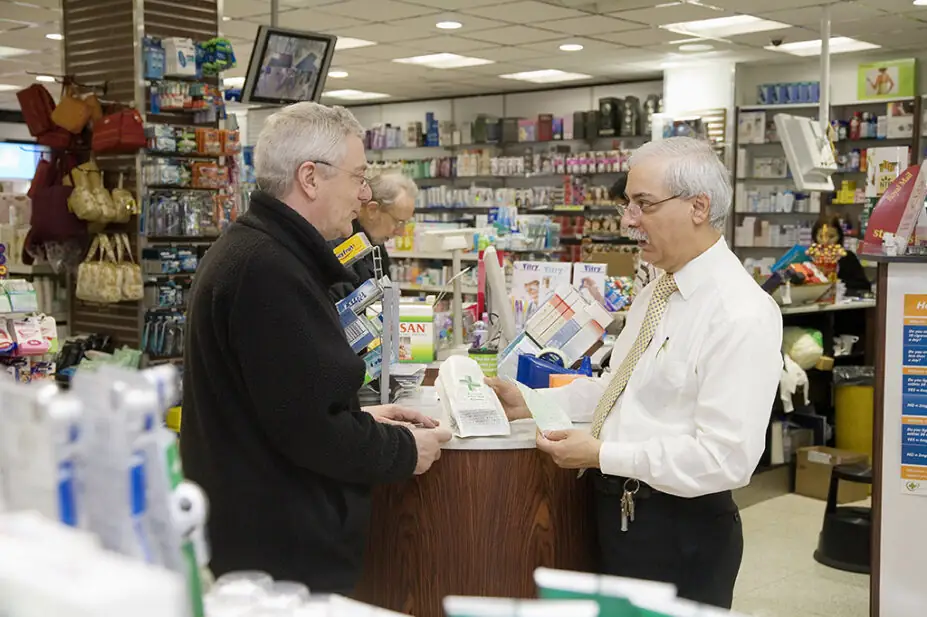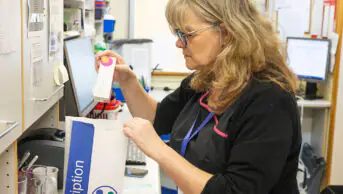
MARK THOMAS/SCIENCE PHOTO LIBRARY
The number of claims made by community pharmacies through the Pharmacy First clinical pathways service varied across England during the first month after launch, NHS data show.
According to pharmacy claims data for February 2024, published by the NHS Business Services Authority (BSA) on 25 May 2024, an average of 12 Pharmacy First consultations were carried out per pharmacy across England, with 10,672 pharmacies recorded as submitting claims to the NHS in that month.
This ranged from an average of 5 consultations per pharmacy in North Central London Integrated Care Board (ICB) — where 1,398 consultations were recorded across 292 pharmacies — to 20 consultations per pharmacy in Bristol, North Somerset and South Gloucestershire ICB, where 3,107 consultations were recorded across 159 pharmacies.
Pharmacy minister Andrea Leadsom previously said, in response to a written parliamentary question in April 2024, that more than 125,000 Pharmacy First consultations were carried out by community pharmacies in February 2024, with 98% of pharmacies signed up to offer the service.
The newly released data from NHS BSA reveals that this figure includes 41,014 acute sore throat consultations, 32,678 uncomplicated urinary tract infection consultations and 18,893 consultations for acute otitis media, with consultations for these three conditions being the most commonly claimed for.
The Pharmacy First service, which launched on 31 January 2024, provides treatment in community pharmacies for seven common conditions, and offers community pharmacies a £15 fee per consultation.
Community pharmacies that provide a minimum number of consultations per month are also able to claim a payment of £1,000. Initially, the minimum threshold for payment was set at 5 consultations. However, this increased to 10 consultations in May 2024 and will increase again to 20 consultations in August 2024.
In April 2024, Community Pharmacy England said meeting the target to access the £1,000 monthly payment was an “area of risk”, with 19% of contractors surveyed by the Independent Pharmacy Association (IPA) saying the targets were “unachievable”.
In an updated ‘Delivery plan for recovering access to primary care’, published in April 2024, NHS England set a target to deliver at least 320,000 Pharmacy First consultations per month by March 2025.
Commenting on the NHS BSA data, Nick Kaye, chair of the National Pharmacy Association, said: “Pharmacy First is an excellent initiative in principle and we want patients to benefit wherever they live, instead of there being a postcode lottery of care.
“This service has the potential to slash waiting times for GP appointments, but it needs the full backing of GPs and others in primary care to make this work.”
“Too often, GPs are not referring people onto pharmacies for convenient support, often because they are not aware of what pharmacies can do. The NPA is in touch with the BMA [British Medical Association] about building trust and cutting through unnecessary blockages in the system,” said Kaye.
Brendon Jiang, vice chair of the Royal Pharmaceutical Society’s English Pharmacy Board, said: “There are a number of factors to making any new service a success, including IT infrastructure, local relationships, and streaming the referrals process.
“We have seen a really positive response to Pharmacy First and local pharmacy leaders must now be given the resources to help drive implementation.”
“It is vital this new service gets the support it needs to maximise the benefits for patients and better manage demand across the NHS,” Jiang said.
On 30 May 2024, the Company Chemists’ Association also reported large variabilities in the number of Pharmacy First consultations provided by its 3,000 members in the first 11 weeks of the service, with almost 13,000 consultations carried out across North East and North Cumbria ICB, and 948 consultations in Gloucestershire ICB.
In its analysis, the CCA predicted that if every ICB had as many consultations as the highest-performing ICB, there would have been a potential additional 600,000 Pharmacy First consultations carried out by community pharmacies.
Commenting on the CCA report, Malcolm Harrison, chief executive of the CCA, said: “Pharmacy First has gotten off to a very promising start but there is still a long way to go to harness its full potential.
“For patients to gain the maximum benefit from this nationally available service, it is imperative that Pharmacy First is fully and equally implemented across the whole country.
“Key to this is boosting public awareness and supporting GP surgeries to refer patients into pharmacy. It’s concerning that the NHS advertising campaign appears to have had little impact,” he added.


